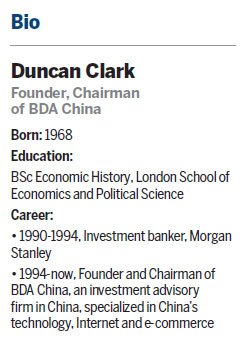The rise of Jack the giant-slayer
Updated: 2016-11-11 07:38
By Fu Jing(China Daily Europe)
|
|||||||||
Author says internet tycoon Ma knew right from the start that Alibaba was going to lead the world
In the summer of 1999, a slightly built 35-year-old sat in his apartment in Hangzhou a year after US e-commerce giant eBay went public and Amazon online was developing into a heavyweight business player. He told a British author: "I am gonna be bigger than them."
That moment was when Jack Ma, founder of the world's e-business leader, Alibaba, first revealed his ambitions to writer Duncan Clark upon meeting him for the first time in Hangzhou, where his business is headquartered.
Clark, who began his own consulting business in China in 1994, recalled that Ma's startup company had hired fewer than 20 people.
|
British author Duncan Clark says Jack Ma essentially stands between two important things - the rise of the private sector in China and the rise of the internet. Fu Jing / China Daily |
Now things are radically different. From July to September, for instance, Alibaba earned $5 billion (4.5 billion euros; 4 billion) in e-commerce revenue, which is more than Amazon and eBay combined in the same period.
With such rapid expansion, Ma, who now employs 40,000 people, has become a frequent guest of state leaders as varied as United States President Barack Obama and Belgium's King Philippe. He has frequently debated e-commerce, digital economy and social progress on global stages.
Recently, his team announced it was setting up a European office in Brussels, headquarters of the European Union.
Just before President Xi Jinping's state visit to the United Kingdom, then-British prime minister David Cameron hired Ma as a consultant to the government on business.
Since getting in touch with Ma nearly three decades ago, Clark, the writer, chairman of Beijing-based BDA China Limited, has been closely observing how this English teacher-turned businessman fulfilled his dream in building up his business empire, against the momentous backdrop of a tenfold increase in China's per capita GDP during the period.
Clark spent a year incorporating his insights, observations and anecdotes into a book of nearly 300 pages, Alibaba: The House that Jack Ma Built. It was written in English but has already been translated into Chinese, Spanish, French and other languages.
"Jack is an interesting combination of humanity and ambition," Clark told China Daily in Brussels recently.
That is the lasting impression Clark has of the tycoon, now aged 52. In 1999, he was talking already very clearly about small and medium-size businesses and now, he says his e-commerce platform is still essentially a hub for small entrepreneurs.
"So I think the reason for using the word 'house', but not 'empire', is that he works for the small guys, the little guys," Clark says, referring to the English title of the book.
Clark says Ma maintains a style of informality and makes fun of his looks, his background and even his mistakes.
For example, according to Clark, after just after the internet bubble boom, Ma realized he had a lot of problems in his company, and that it was expanding too fast. He had an office no more than the size of a normal bedroom.
At the time, Ma had hired a foreign executive but cut his office to half its size.
"You know, many rich bosses in China have huge offices and heavy furniture. Well, he is very informal in that sense. So I think he doesn't bring people to his side by showing off," Clark says. "His charisma is built on his humanity. Don't mistake it. He is very ambitious."
Even though Ma has made an impression on Clark, he says this book is not for Jack Ma.

"I mean, it is an independent book. I don't have any connection with Alibaba," he says.
But Clark says he did invite Ma to Stanford University in 2011 when the writer was a visiting scholar there. Ma came to speak and gave an interesting speech on his dispute with Yahoo.
Clark sees that time as a key moment, as he was doing research on a possible book on the internet revolution in China, and the focus would be on e-commerce and social changes in the country.
"From that encounter, I think Ma essentially stands between two important things - the rise of the private sector in China and the rise of the internet," Clark says.
Though Clark intended to write the book in 2011, the real impetus came after Alibaba's successful IPO in 2014, though the stocks started going down soon before coming back again.
"I think it was the IPO made people realize that Alibaba is really a story," Clark says, adding that CBS filmed and interviewed Ma quite a long time ago, but didn't run the hourlong program because people in CBS asked "Is this company really that big?" Only when the IPO happened, did it finally broadcast the program, which it had put together a year and a half before.
After getting a publishing house's green light, Clark contacted Alibaba, which gave him access to the company so he could come to visit, talk to employees and do research.
But he has not seen Ma himself during the writing of the book, saying that he will one day write his own book so no one would misunderstand him.
"And after we did so much research on all of his speeches, there is so much of Jack's (material) already," Clark says.
He says that in this book he is actually critical of Ma and the company in some aspects, particularly on Alipay in 2011, which Clark felt was controversial.
On Ma's weaknesses, Clark says sometimes he is too blunt.
"I think some people will be miserable, like public relations people: They cannot control him," Clark says. "He loves to be very instant, and very spontaneous but also very strategic. He is like a stand-up comedian and can be spontaneous, depending on the audience. He is also a master diplomat in a way."
Even so, Clark says, Alibaba showed trust.
"Their trust is pretty good because even in an American company, if you say you are writing a book, they would probably require you to send them a copy and give you some suspicion," Clark says.
But Alibaba just told Clark that whoever he wanted to talk to in the company, he should just let them know. With such support, Clark talked to former employees, investors and competitors to find the true Jack Ma. Even those who were fired by Ma were interviewed.
Ma started out as a tour guide with humble beginnings. And Clark says Ma is still a tour guide but on a world scale now.
"The G20 in Hangzhou was fantastic imagery. He is the guide who grew up with tourists and now he's growing up with presidents of countries and CEOs," Clark says.
"He really got this passion" for introducing China, Clark says. "I think he is very proud of Chinese history and culture.
"I think, in a way, he is performing the same role he is always performing to send his message to trust in the internet and small businesses."
Clark says Ma has a global view on charitable undertakings, and has been heavily influenced by Bill Gates and Warren Buffett.
"He sees himself as a global citizen, and again, as a tour guide. His English is good enough to communicate, so people are drawn to him."
Buried in his work, Ma, according to Clark, cares about his own health and has his personal trainer traveling with him. He also meditates.
"He is surprisingly relaxed, and sometimes you see he is tired. He travels a lot," Clark says. "He doesn't seem stressed, and he is very relaxed on stage, even with President Obama."
According to Clark, Ma is a natural performer and loves being with people and crowds.
"He said he doesn't want to be famous, that he regrets running Alibaba," says Clark. "But this is just showmanship."
Yao Yueyao contributed to this story.
fujing@chinadaily.com.cn
(China Daily European Weekly 11/11/2016 page32)
Today's Top News
China, UK 'golden era' strengthens
UK business calls for a London-only visa system
First Chinese named as new Interpol chief
Chinese-Hungarian Friendship awards presented
Polls missed support for Trump
Superstars party with Jack Ma before shopping spree
Europe would elect Clinton: Poll
Obama, Trump meet at White House
Hot Topics
Lunar probe , China growth forecasts, Emission rules get tougher, China seen through 'colored lens', International board,
Editor's Picks

|

|

|

|

|

|








